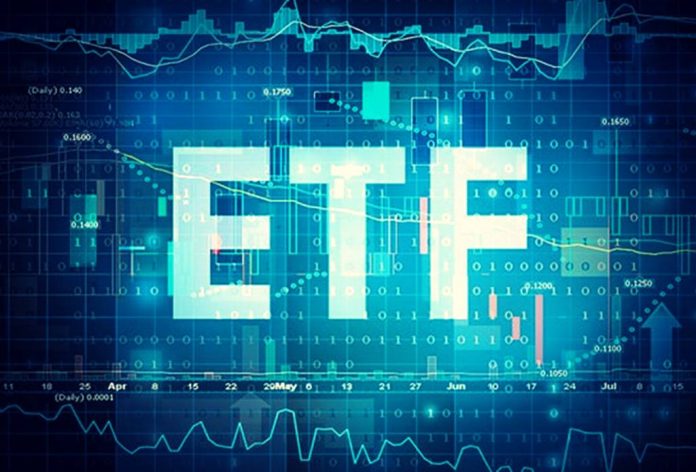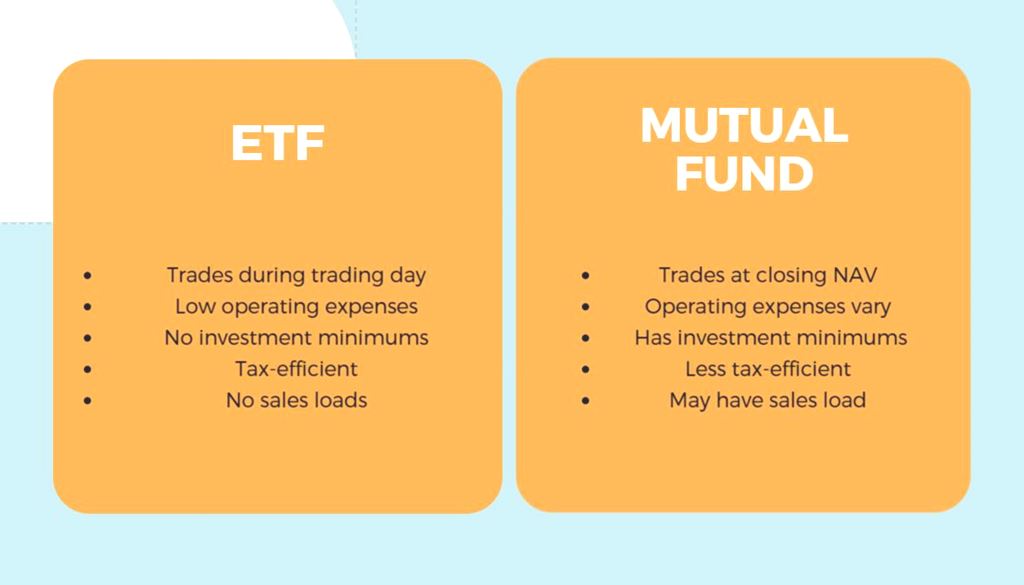
An exchange-traded fund (ETF) is a passive investing instrument that tracks underlying benchmark indexes (such as the NASDAQ-100 Index, S&P 500, Dow Jones, and others), commodities, bonds, or portfolios of assets and replicates their performances. ETFs can be traded like a common stock on exchanges, combining the diversified holdings of a fund with the low cost and tradability of a share.
What is the difference between ETFs and mutual funds?
ETFs and mutual funds are both financial products that put together securities to offer investors diversified holdings. However, ETFs are passive investing instruments, while mutual funds rely on professionals to actively manage investments on behalf of others, at a fee.
Because they trade on exchanges just like a stock, ETFs trade throughout the day and experience intra-day price changes, while mutual funds trade only at the end of the day at the net asset value (NAV) price. An ETF does not have its NAV calculated once at the end of every day.
Most ETFs track a particular index and replicate its performance. Thus, ETFs have lower operating expenses than actively invested and managed mutual funds.
Unlike traditional mutual funds, ETFs have no investment minimums or sales loads.
Additionally, the supply of ETF shares is regulated through a mechanism known as creation and redemption. ETFs create and redeem shares with in-kind transactions that are not considered sales. When a fund manager liquidates underlying stocks and securities in a mutual fund, tax laws dictate that a capital gains distribution payment is made to shareholders. The creation and redemption mechanism allows ETFs to decrease or avoid capital gains distributions. Therefore, ETFs are more tax-efficient than mutual funds.

What is the difference between ETFs and index funds?
ETFs and index funds involve investing in an underlying benchmark index and are both passive investing instruments. Unlike actively-managed funds, passive investments are not designed to outperform the market, but rather be the market. For instance, when you buy shares of an ETF, you are buying shares of a portfolio that tracks the yield and return of its native index. An ETF doesn’t try to outperform its corresponding index, but merely replicate its performance.
Both ETFs and index funds remove the so-called “manager risk” – the risk that a fund manager will make a mistake and end up losing to a benchmark index. Both ETFs and index funds have low expense ratios compared to actively-managed funds.
However, ETFs and index funds are fundamentally different in one way: index funds are mutual funds, while ETFs are traded like stocks. Unlike index funds, ETFs can be bought and sold throughout the day on the stock exchange.
What is a bitcoin ETF?
A bitcoin ETF would track the bitcoin benchmark index and replicate its daily performance, allowing people with a brokerage account to invest in the cryptocurrency without having to worry about the challenges of buying, storing, and safekeeping it.
In order to be launched as a financial instrument, the bitcoin ETF needs to be approved by the Securities and Exchange Commission (SEC) first.
Considering that the Winklevoss Twins’ bitcoin ETF product has been waiting for approval since 2013 and SEC keeps casting off bitcoin ETF proposals one by one, there is no definitive go-ahead currently in sight.
Featured image source: financial.org
« Back to Wiki Homepage









